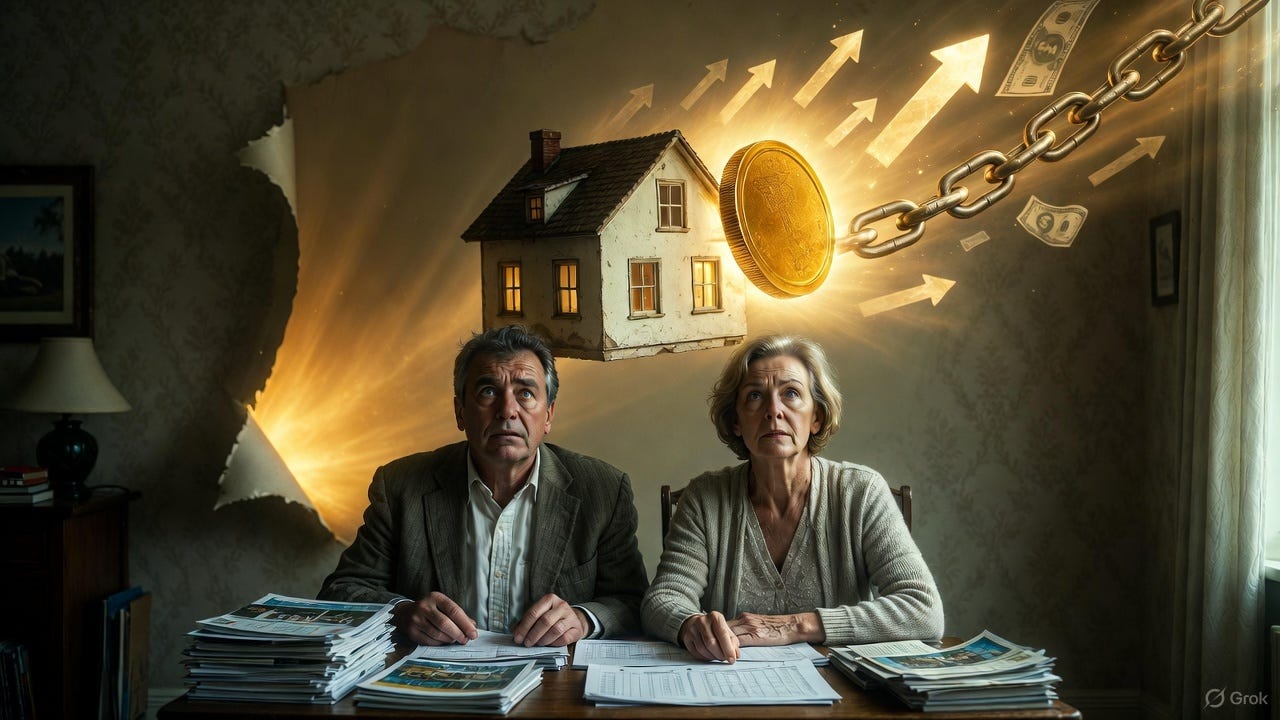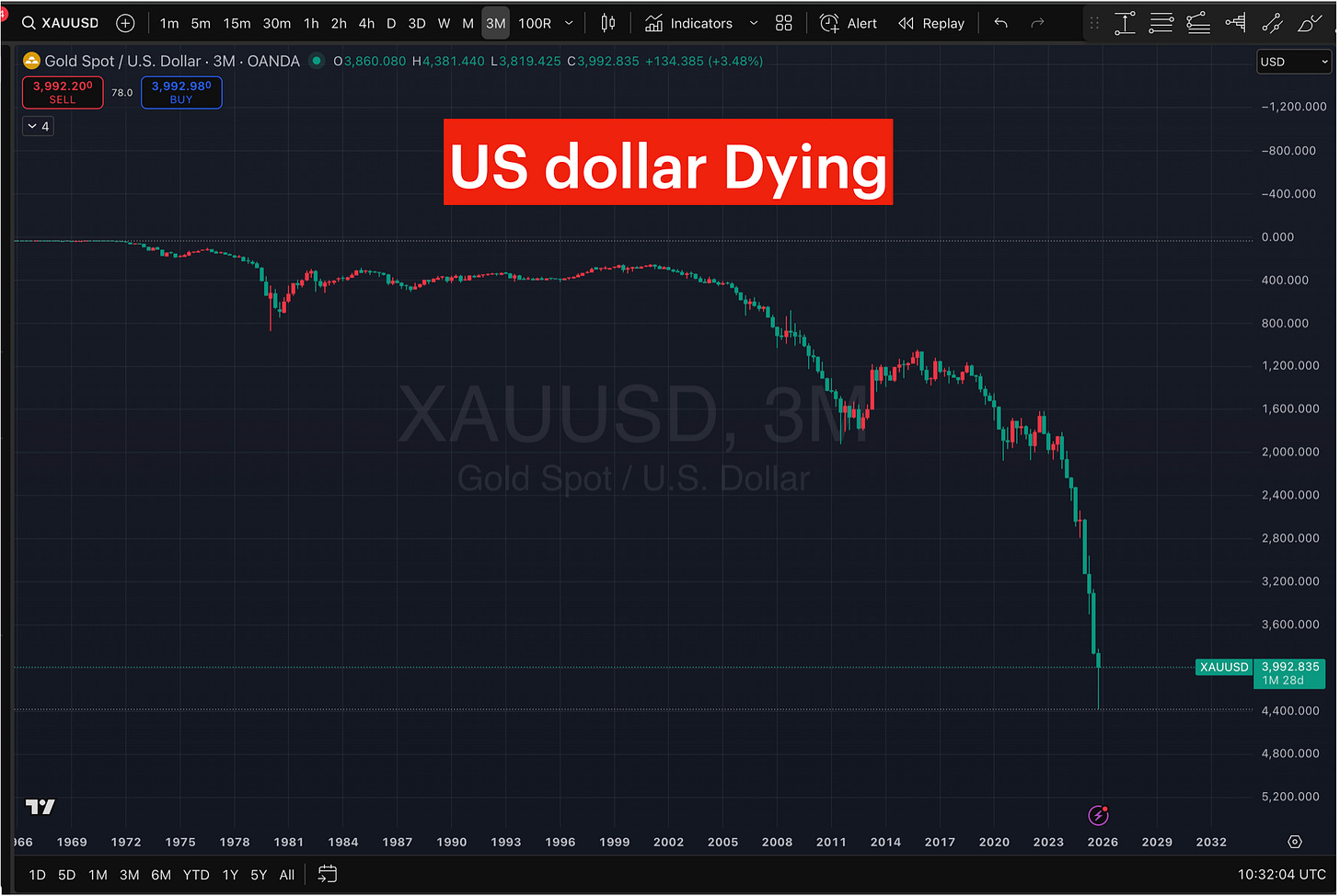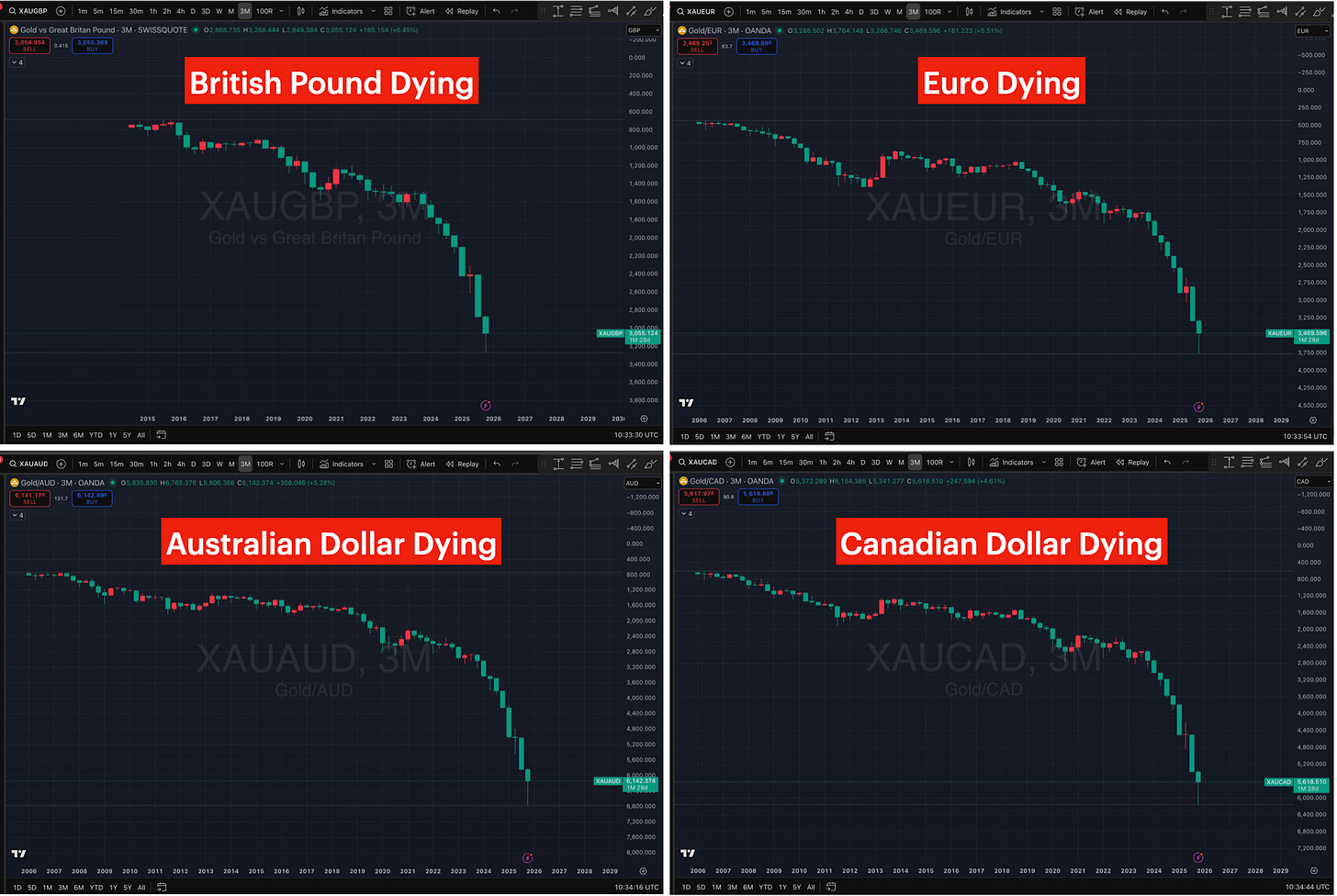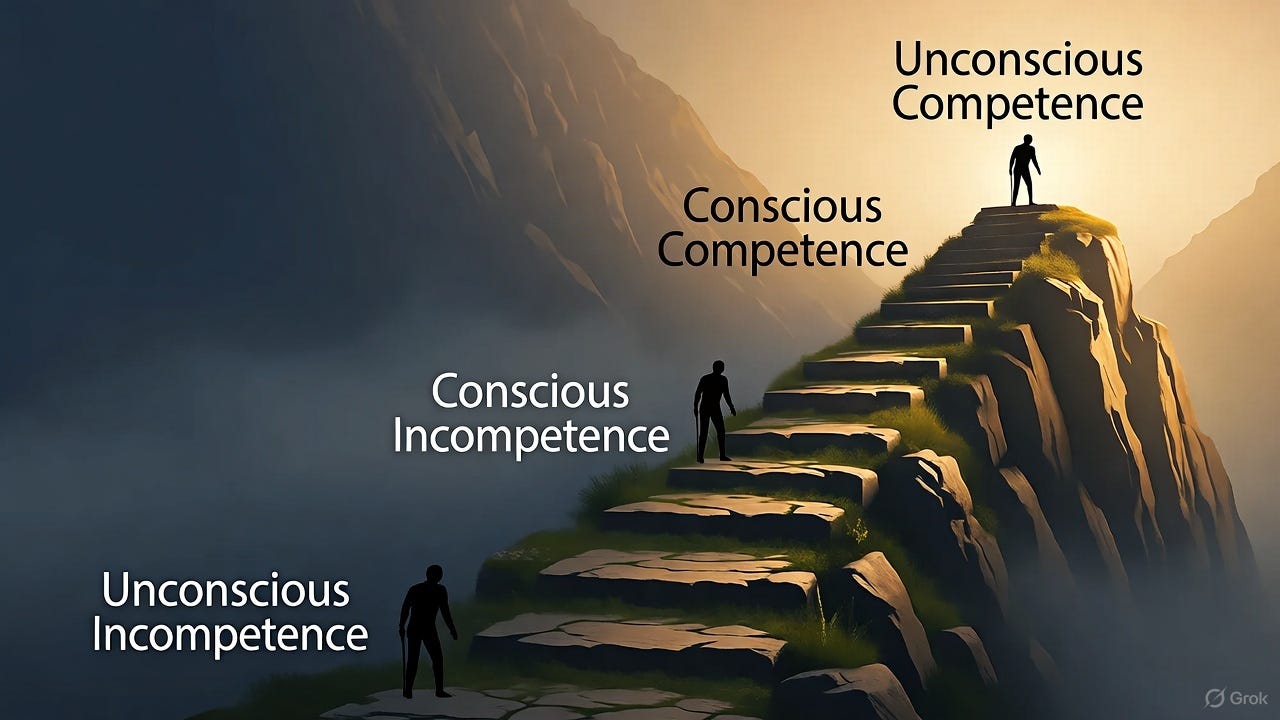What Do I Do With All My Property Now? (Part 1: The Wake-Up Call)
Why decades of buy-and-hold, leverage-heavy property investment may now be the trap you never saw coming.
I recently told you about my effort to not be the only rich guy in the village. Well, one of the people who attended my local event was a successful local businessman who also owned a fair bit of residential real estate.
He started buying real estate in the 1990s when the UK was in a deep recession. Then, in the early 2000’s after listening to other experts in other pubs, he sold out way ahead of the major price move up. Don’t get me wrong, he’d made a lot of money on the purchases, but he just sold when he thought prices were high.
He got back into property sometime around 2014. This time, he had gone bigger on it, and developed businesses around it. He had become successful at it, and he delivered a sought-after service.
He’d also been buying gold for a while in the form of British Gold Sovereigns, which are tax-free to buy and tax-free to sell. So a very popular method for people in Britain is to save in Gold Sovereigns. Well, popular among the tiny, tiny percentage of people who own gold in the UK, which is less than 0.5% of people.
He was concerned about the current downturn in the property market and that properties were not selling. Or at least they were difficult to sell.
The problem with real estate is that it is an illiquid market. Getting at your profits can be painfully slow, unless you are willing to take a 20-40% hit on the value in order to release your equity fast.
In 2020, we (my wife and I) were heavily exposed to real estate, and there is the pain of selling and paying the capital gains tax bill, which eats a huge chunk of the gains. But it is a cost of doing business.
Property had gotten me into trouble when the world’s banks all fell foul of it in 2008 and I was over-exposed to the risk. But then in the following decade the properties we had managed to hang on to (there were quite a few), had provided a great income source.
So in 2020, ahead of knowing for certain that FIAT currencies were going to massively lose value against gold and silver (die), I had to make the decision to sell the real estate that had funded our life.
Here are those images again:
I had to make the decision back then, because I knew that a) it would be a nightmare selling off all the properties we owned, b) that by the time it became the obviously correct thing to do, everyone else would know it too and I would be in a price war to sell with everyone else.
So I had to make the call ahead of knowing I was right. In 2020 and 2021, everyone wanted in on the real estate business, so I was selling into strength.
What’s more, I knew I was giving up the income source that had meant I never needed to go to work. I liked that income source, so removing it was not a nice thing to do, and my wife liked that money too, so I had to explain my thinking to her to get her to buy into this painful course of action.
But no income meant that after the equity stopped coming (whenever that would be), I would either need to go back to work - aka build or revive a business, or I would have to learn a new way of making money.
I did not fancy going back into business as I had lost the passion for it. So instead, I decided to learn a new way of making money.
I had always liked the idea of trading stocks and I liked the tax advantages the UK had for looking after their chums with money - just the way it is, I don’t make the rules.
Plus, I needed something to stop me from going insane while offloading a great big stack of property.
The problem I saw was that, if I was right, all the properties we owned would, one day in a few years, become a millstone around our necks. As would all the mortgages, but I’ll explain that further on.
Selling them took several years to achieve and was not helped at all by the government and the Bank of England attempting to close off all property sales in the UK by raising interest rates.
Also not helped by the UK Land Registry moving from incompetent to a new word being needed as a replacement for the word incompetent. All solicitors becoming pansies and deciding that everything in the legal process should be slowed down by a factor of at least 67%, maybe as much as 85%. And, with some property sales, they decided that their clients shouldn’t buy the properties, but not tell them…
As a property investor, it’s rare to find an experienced property investor who has good things to say about their solicitor. But in recent years, solicitors have demonstrated that the scale for how bad they could be completely underestimated their general hindrance to the process. If you find a good solicitor, shoot them, because they will go bad on you.
Basically, selling properties in the UK for a reasonable price became a nightmare over the last few years. So learning to trade stocks during that time was a wonderful distraction from this nightmare.
So now we have completed the removal of this asset class from our financial world and placed the funds into gold and silver and the mining companies. Plus, I’ve learnt how to make more than enough income from trading and now I’ve even gone on to teach this skill too. So we now live in a much better world… And even though this was a gamble at the start, it really has paid off on multiple levels… As I will now attempt to explain.
The main problems the property world are yet to face are multiple, and I will not get them all here… But here’s just some off the top of my head….
Approximately 50%+ of people renting are reliant on government support to pay their rent - and the UK government is broke. When, not if, the government goes to the IMF (International Monetary Fund) for a bailout, the IMF will tell them to cut costs. Housing will certainly take a hit, big time. This will affect all Landlords, whether you rent to government-funded tenants or not.
Without rents being paid by the government, many migrants will go home (potentially a good thing for the country - potentially), but this will mean a glut of property to rent, the opposite of what we have now. So mortgaged properties will be in trouble, real trouble.
When a housing recession really takes hold, everyone wants to sell and there are no buyers, and the banks do not and will not want to lend - so you have to become a contrarian and sell when you are in the good times. Even though the property market is bad now, it is likely to get much worse.
In a recession the cost of maintenance on a property increases.
In a recession the number of tenants defaulting increases.
The court system favours the tenants in times of trouble.
The property laws are set up to favour the tenants, then the lenders, then you.
The UK works on variable interest rates with 1, 2, 5, and 10-year fixed rate mortgages available - WHEN the banks want to lend. In a recession, as I said, they do not want to lend.
As the value of currency declines, the interest rates will have to rise in an effort to protect the value of the pound. I fully expect to see mid double-digits on interest rates again within the next 5 to 10 years.
As interest rates rise, the repossessions increase and the chance of selling property at reasonable prices goes away. Selling at a loss now becomes a possibility, if not a probability.
Tenants are already maxed out and cannot afford to pay the rent and also live now. So as interest rates rise, the chances of you continuing to raise rents on them becomes almost impossible.
Which all means the Landlords will have tenants who can’t afford to pay, high costs to maintain, high interest payments and less income than they have now. So they will be desperate to sell.
Rachel Reeves is talking about inflicting National Insurance payments on your rental income and I’m sure she’s cooking up more pain for property investors.
As I said, all of that lot were just fired off the top of my head in the last few minutes… There are many other problems regarding regulations and changes to the law too.
But the funny thing is, none of those compares to the real problem real estate is about to face…
I realised in 2020 that a fundamental change was happening to the UK property market and, as yet, no one in the property world has pointed this out. None of the gurus have mentioned what I am about to show you.
I have not pointed it out since discovering it and knowing it for five years now, but I will today.
Can you guess why I didn’t want to point it out?
Simple, because I wanted to sell everything I could before anyone caught on to what was going to happen…
So here comes the paradigm-shifting moment, which you may have sort of known, probably something you’ve felt but not ever articulated. So you property investing guys out there, strap in… As this may become painful.
People get into the property business because they want to buy assets that are going up in value. They can also leverage this to gain much greater leverage using someone else’s money, aka a mortgage.
It has been the backbone of the property market in the UK. The adage everyone is programmed with is, ‘Property prices are rising, so you must get on the ladder, as it will cost you more tomorrow if you don’t!’
So all or most of us property investors, we all got in for the capital appreciation. The rent gave us some income too… What was not to love about that? But it was the capital appreciation we wanted most.
But here’s the thing, we were not in the property business, property was just the vehicle. We were actually in the inflation business.
***
What we think of as money is actually currency, and currency was being devalued with every single new loan taken out to buy a property. As property investors, we were feeding the inflation ourselves by our own actions.
Which meant the prices were rising, because the prices were rising.
And we had a leveraged bet on that… Which we thought was really smart…
So let’s play with a few numbers because this is going to get funky!
The average house price in the UK in 2000 was £81,600; the average price today is approx £272,000, so a 233% gain (assuming no costs and no income).
You sell that and you make £190,400 - less capital gains tax of £53,312 (we’ll go for full fat 28%, and zero costs to sell to keep things simple (simple’ish))) = £137,088.
So really, it was a gain of 168% over 25 years....
But that’s not real either, is it? Because we took out a mortgage to achieve this…
So let’s get real, £81,600 purchase price, deposit of 20% = £16,320. Yes, I know, the deposit may have been 5%, 10%, 15%, 25%... But I am attempting to keep this simple and, even at the simple level, it’ll still get funky!
So with only 20% of our money in the investment, then we have a MUCH greater return on our investment… We get 840%!!!
In 25 years we turned £16,320 into £137,088 thanks to our smarts and other people’s money.
We real estate investors truly are masters of the universe!
Or are we?
I could write yet another book answering all the details here, but I am just attempting to convey a point. And I remember what talking to property investors is like, so let’s not get pedantic and keep our minds on the big picture as I have a doozy of a point for you to digest.
Let’s now also throw a curveball into the mix.
The price of one ounce of gold in the year 2000 was £186.16, and the price of one ounce of gold today is £3,040 - so a gain of 1,633%. That looks a bit good…
Let’s look at it after tax… 1,633% gain, becomes 1,633% gain… Because there is zero tax on Gold Sovereigns and Gold Britannias in the UK!
So…
No dealing with estate agents…
No dealing with solicitors…
No dealing with financial advisors…
No paying mortgages…
No dealing with letting agencies…
No dealing with tenants…
No evicting tenants…
No attending court…
No selling property…
No accounting…
No annual tax…
No messages saying, ‘the boilers gone.’...
No electrician call-outs…
No emergency plumber visits…
No, trying to track down an emergency plumber…
No new locks needed…
No arguments about deposits…
I could go on and on and on… But you get the message. We real estate investors do not have it as easy as outsiders think we do.
You did all that to make 840% on your money, when just putting it into gold and remembering where you buried it would’ve made you 1,633%...
How do you feel now, you master of the universe you 🙂
I know how you feel, because I felt it when I figured it out!
Don’t get me wrong, right now you are in denial. You are like Neo in the Matrix when the Architect drops a truth bomb on him…
But when you’ve had a chance to digest this, and you slowly realise that everything I just said and am about to say is right, then I know how you feel because that’s how I felt when I figured it out…
But don’t worry, it gets worse than that… Way worse!
The reason you made that 840% gain is because inflation was driving up the nominal prices of property… The nominal price of property being the price or the value of it. But to get the true value of it, you always have to compare it against gold. Because gold is where currency GBP, USD, EUR, AUD, CAD all get their value from.
I digress… The reason you made that 840% gain is because inflation was driving up the nominal prices of property…
Yet did you notice that the nominal prices didn’t even keep pace with inflation against gold? Let alone exceed it… Let alone consider the work, time, effort, disappointment and heartache.
Think about all your time and effort… All of that against the effort of buying the gold and putting it somewhere safe…
But wait, there’s more…
The gold price inflation is set to increase at a greater rate than before. It’s going to speed up!!!
Even the head of the world’s biggest bank, JP Morgan, who could by no means be described as an ardent gold bug, expects gold to go from the current $4,000 to $10,000 in the next few years…
***
So I know how much you property investors like to consider your future gains… Why don’t we factor that into the calculation…
The price of gold in the year 2000 was £186.16, and the price of gold in say 2030 would be £7,676 - so a gain of 4,123%.
Do you think your real estate assets are going to make that kind of return by 2030?
According to Savills, the average UK house price is expected to reach around £440,000 by 2030. I would say this is beyond optimistic but it may achieve it nominally. Value wise it doesn’t have a chance of getting there…
Given the current state of the UK economy, I would say if your properties hold their ground and are still at today’s prices, they will have done well by 2030. In other words, I am all but certain your properties will lose value against real money in the next five years, even if they nominally appreciate in price. Which means, I know you are in a losing investment when measured against value.
But let’s assume Savills are right and not deranged…
A purchase price of £81,600 in 2000, a deposit of 20% = £16,320 - Sale price £440,000.
You sell that and you make £358,400 - less capital gains tax £100,352 (we’ll go for full fat 28%, and zero costs to sell to keep things simple (simple’ish))) = £258,048.
So then we have a MUCH greater return on our investment of 1,581%!!!
So even if Savills figures are right, you didn’t even catch up to what you would’ve made on gold already had you just bought it and put it in the ground in the year 2000, that would’ve made you 1,633%…
And even with all that leverage, and all that work, and all the unexpected rocks the government will be throwing at you… The best projections are for just over 1/3rd as much as you can make by just buying gold and sticking it in the ground today…
You are in a losing trade when compared to gold. I can’t make it much simpler!
Let’s not forget about inheritance tax.
Our wondrous, kindhearted Government takes 40% of your kids’ money when you die, tax on money you already paid tax on. Whereas, what do they get if you just let your kids know where they can dig up some gold…
Now obviously, I could never condone that sort of behaviour. The problem I found personally was that right after I bought my gold, I had an unfortunate boating accident…
So let’s reset… You’ve made your money in property, thanks to inflation…
Now consider this…
What if the asset price inflation goes away?
Not that the house prices lose value, that’s another story. But what if they stop appreciating in value… Every penny you have wrapped up in your property is going down in value against real money… Remember those currency charts I showed you? Well, that’s what your investment looks like in real terms…
How do you feel about that? I know, because I worked this out in 2020!
Do you still want to be in the property business when just owning gold, owning real money is betting that the governments will continue to inflate away the value of their currency…
Owning gold is betting that your government are a bunch of idiots. Not many safe bets in the world, but this comes real close.
If you like the idea of doing nothing, and betting that the governments are going to continue screwing it up, and making at least twice as much money for doing nothing… Then it is way past time to dump your properties…
The truth is, since 2000, if you are a property investor, you have been losing out against gold, and that is about to speed up.
***
Did you also know that you can borrow against your gold?
So just imagine if you had bought £25,107 worth of gold in 2000, then you could’ve borrowed the deposit for your property. Your £25,107 would be worth £409,997 today.
Frankly, we were all lied to about money, what money is, how it works etc. When you start understanding inflation, that’s when you can really begin to profit from it.
So what should someone do now who owns property?
I’ll cover that properly in my next message to you, as this one has gone on way too long…
But I thought I needed to get over the truth about investing in real estate for capital appreciation purposes…
As always, there’s a solution, but first I had to get you out of Unconscious Incompetence and move you to the state of Conscious Incompetence.
Right now, you are probably in shock, or denial, as I was when I figured it out…
But I suggest you read it slowly through again a couple of times and let it sink in. After a while, you should start to feel like you sort of knew this already…
But I think a stiff drink may be in order to help with your ruminations…
Have fun with your thoughts. Whatever doesn’t kill you does make you stronger.
Best wishes,
Andy
My thesis for why I think this way:
Fiat currency is fundamentally broken. Since 1971 it has lost over 99% of its value, and that decline is accelerating. Governments are too far off‐course to reverse this trend. So they will likely resort to hyperinflation as the easy way out. While people see prices rising, they don’t always see how rapidly their purchasing power is eroding. The implication: pensions, savings, and assets accounted for with government money are at grave risk. To guard against this scenario, individuals should move at least 5% of their assets into physical gold and silver that they hold directly.






The way you illustrated the businessman's journey through market peaks and troughs, especially around illiquid assets like property, truly highlights the persistent challenge of predicting economic shifts, a task where even advanced statistical learning often strugles.
Another thought provoking article! I am sending it to everyone I know who owns more than one property!